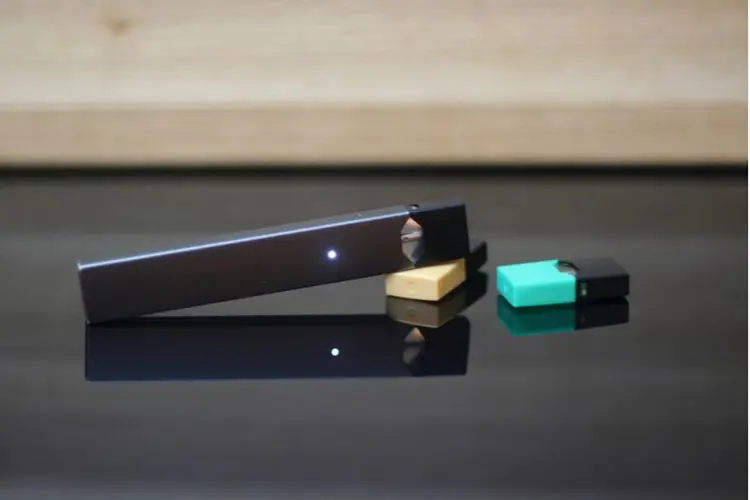JUUL Labs is quitting the Vapor Technology Association (VTA), after a year of major financial contributions to the vape industry trade group. JUUL cited strategic conflicts with VTA, including JUUL’s support for Tobacco 21 legislation and banning some e-liquid flavors, which the VTA opposes.
The e-cigarette company announced Tuesday that it will not renew its VTA membership when it expires later this month. The company reportedly posted the statement, titled “Our Commitment to the PMTA Process,” on its website without first warning VTA leadership of its decision.
JUUL objects to having any association with VTA’s recent lawsuit against the FDA that challenges the agency’s new May 2020 deadline for submission of premarket tobacco applications (PMTAs) by vape manufacturers. JUUL remains convinced that it can submit a successful PMTA by next year, and it would prefer to avoid headlines like “Vaping Companies, Including Juul, Sue FDA To Delay E-Cigarette Review.”
“We are fully committed to the current PMTA process and are confident in the content and quality of the materials we will submit with our application by May 2020,” said the JUUL statement. “We are not appealing the recent federal court case in the District of Maryland and similarly do not support the recent lawsuit against FDA filed by the Vapor Technology Association in the Eastern District of Kentucky.”
JUUL’s exit from VTA is only the formal divorce after what was always a rocky marriage.
Of course, unlike every other company in the independent vaping industry, JUUL has the resources to play the PMTA game. It will probably require millions of dollars (for each individual product) to do the research and testing necessary to submit an application that has a chance at FDA approval. JUUL, with its soaring convenience store sales and $12.8 billion investment from Marlboro manufacturer Altria, has the cash, facilities and staff to complete as many applications as it wants to.
But submitting an application doesn’t mean approval. Former FDA Commissioner Scott Gottlieb, for example, is not so sure JUUL will be successful with a PMTA. The company that inspired Gottlieb’s teen vaping “epidemic” will still have to deal with the firestorm of controversy that follows it at every turn, and that may make the FDA gun shy about approving its products. “[Unfortunately] the crisis created by products like JUUL put this entire segment at grave risk and made it hard to prove a net public health benefit [in a PMTA] for a JUUL like product,” wrote Gottlieb in a tweet.
It is an ironic and comic twist that JUUL—after being the target of almost two years of relentlessly bad press—is afraid that the rest of the vaping industry will create public relations problems that might damage its chances at FDA approval. JUUL acts as though it has a reputation to protect, when it may well be the single most hated company in the country from any industry—despite being in a crowded space of pod vape companies that sell pre-filled nicotine salt devices designed to help smokers quit.
As always, JUUL won’t fight back against its critics, but will stay quiet and even make concessions to the anti-vaping activists calling for its head. It is those concessions that have made JUUL a name spoken with venom by most of the small business owners in the vaping industry. JUUL’s exit from VTA is only the formal divorce after what was always a rocky marriage.
JUUL’s support for Tobacco 21 has always been unpopular among the VTA rank and file, but its willingness to indulge the tobacco control hardliners who demand flavor bans and restrictions has led industry insiders to question whether there is anything JUUL is willing to fight for. JUUL, after all, removed its flavors from store shelves voluntarily, before the FDA announced it would force them to.
JUUL will not get credit from the Campaign for Tobacco-Free Kids for its stand against other companies’ flavors.
“While we have appreciated the opportunity to collaborate with the VTA, we will not renew our membership when it expires later this month as we are not aligned on too many critical policy issues,” said the company’s statement yesterday. “For example, we support clean Tobacco 21 legislation and an outright ban on certain flavors.”
Vaping360 asked JUUL Labs which flavors the company supports banning. We were told by a JUUL spokesperson to refer to this paragraph from a recent Washington Post op-ed by JUUL CEO Kevin Burns:
“We support the FDA’s draft guidance restricting the sale of certain flavored products, including Juul pods, at retail outlets and online,” wrote Burns. “There is no place for kid-appealing flavors in the marketplace. That is why we would also support an outright ban on such flavors, including those that mimic candies or childrens’ foods. We also support the FDA’s swift enforcement against any manufacturer that packages or markets its vapor products in a way intended to promote use by minors.”
The statement could be read as opposition to supposedly “kid-appealing” packaging, rather than the actual flavors. But JUUL has made similar statements before, listing specific names of e-liquid flavors it finds objectionable. The joke, of course, is that probably no e-liquid flavors ever produced by any company have been more popular with actual teenagers than JUUL’s flavors.
JUUL Labs is well aware that the majority of businesses in the independent vaping industry in the United States, including almost all of VTA’s members, depend on e-liquid flavors. That is the product that drives sales and profits, and it is the wide variety—yes, including candy flavors—that keeps many adult vapers coming back to vape shops instead of buying cigarettes. It really shouldn't matter what flavor an adult has in their vape pen. But while JUUL’s willingness to go along with the “flavors hook kids” narrative looks like the rich pod vape manufacturer throwing the little guys under the bus, it’s really just another example of the company’s determined self-delusion.
JUUL is a perfect dartboard for tobacco control hatred, a passive target that even apologizes for offending its enemies.
JUUL will not get credit from the Campaign for Tobacco-Free Kids for its stand against other companies’ flavors. The tobacco controllers who want JUUL put out of business don’t separate “good” vape flavors from “bad” vape flavors. They hate all vape flavors, and they hate JUUL’s flavors the most because they hate JUUL the most. JUUL is a perfect dartboard for tobacco control hatred, a passive target that even apologizes for offending its enemies.
The small business owners that started the vaping industry and have been fighting to keep it alive for more than 10 years were always suspicious of the San Francisco vape company that arrived in 2015, and presented itself as a cool Silicon Valley tech startup. Now, after two years of suffering for every dumb mistake JUUL has made, they view the hipstery vape moguls with outright contempt.
JUUL will carry on with its strategy of passivity and compliance, gratefully accepting every criticism—even outrageously unjust criticism—from politicians and anti-vaping activists, and praying that the FDA regulators that hold its future in their hands won’t notice. It will continue to trip over its own ignorance of the history of tobacco and tobacco control, and even if it fails with its PMTA it will muddle along selling in other countries until opinions shift.
But the small businesses the VTA represents can’t afford to submit PMTAs, and they can’t afford to wait out the vaping moral panic raging across the country. They don’t have billions in the bank, and their employees didn’t get seven-figure bonuses last year. Their only choice is to sue the FDA and hope for a miracle. JUUL doesn’t want to be seen as being part of that.
Statement from the Vapor Technology Association
VTA issued this statement Wednesday afternoon:
Yesterday, Juul Labs announced that it would not be renewing its membership with the Vapor Technology Association (VTA) citing the lawsuit that VTA recently filed against FDA and policy differences.
VTA is surprised by Juul’s stated opposition to the filing of VTA’s complaint against FDA because Juul recently opposed the efforts of the American Academy of Pediatrics to grossly accelerate the PMTA deadline in another lawsuit and sought similar relief in that federal lawsuit. In addition, Juul’s designated VTA Board member participated in the VTA Board meeting held to consider the lawsuit against FDA, but never objected. In fact, the vote to move forward with the lawsuit was unanimous. Prior to the meeting, Juul had the relevant documents relating to VTA’s consideration of a potential lawsuit against FDA, but never objected or expressed opposition to the action.
From its inception, VTA policies have consistently focused on creating and preserving a diverse marketplace of products for adult consumers desiring an alternative to smoking cigarettes. A diverse marketplace includes both open system devices and closed system or “pod” devices. A diverse marketplace includes vape shop small business and convenience store options for adult smokers to access products. A diverse marketplace includes the many flavor options adult smokers have been purchasing in lieu of the same old tobacco and menthol flavors that are sold by Big Tobacco. A diverse marketplace includes e-liquids containing a variety of nicotine levels, including zero nicotine, to provide adult smokers with the option to reduce their nicotine intake.
We appreciate Juul’s past attempts to collaborate with VTA. We recognize that some decisions made by VTA on behalf of the industry may not perfectly align with the interests of every one of our members. However, we believe our strength as a trade association is our diverse membership.
VTA is organized so that no single member, no matter how large, can dictate policy. We put our decisions through a regimented process to make sure they are based on sound and strategic rationale. We avoid taking reactionary positions based on transitional moments or the news of the day and remain focused on securing the long-term future of a diverse and well-regulated vapor industry.
As a reminder of what is at stake, the FDA recently warned that a precipitously accelerated PMTA deadline would lead to the “mass market exit of ENDS products” and cause adults who have quit to return to smoking - a "public health outcome which should be avoided if at all possible.” VTA’s and Vapor Stockroom’s lawsuit against the FDA was filed to avoid that “mass market exit” about which FDA warned and to preserve the diverse and vibrant industry of companies dedicated to providing adult smokers an alternative to deadly cigarettes. VTA stands by its decision to defend the interests of all vapor companies, and the thousands of small businesses in the U.S. that will be put out of business without the relief requested in our lawsuit.
VTA is proud of its rapidly growing membership. We are committed more than ever to advocating for rational regulations that will ensure the availability of a diverse array of product options for adult smokers. We simply ask that all other vapor companies which believe in our vision of a diverse and vibrant marketplace join us in our fight.
Thank you for all that each of you do everyday to defend the promise of vapor!
The Freemax REXA PRO and REXA SMART are highly advanced pod vapes, offering seemingly endless features, beautiful touchscreens, and new DUOMAX pods.
The OXVA XLIM Pro 2 DNA is powered by a custom-made Evolv DNA chipset, offering a Replay function and dry hit protection. Read our review to find out more.
The SKE Bar is a 2 mL replaceable pod vape with a 500 mAh battery, a 1.2-ohm mesh coil, and 35 flavors to choose from in 2% nicotine.
Because of declining cigarette sales, state governments in the U.S. and countries around the world are looking to vapor products as a new source of tax revenue.
The legal age to buy e-cigarettes and other vaping products varies around the world. The United States recently changed the legal minimum sales age to 21.
A list of vaping product flavor bans and online sales bans in the United States, and sales and possession bans in other countries.



















